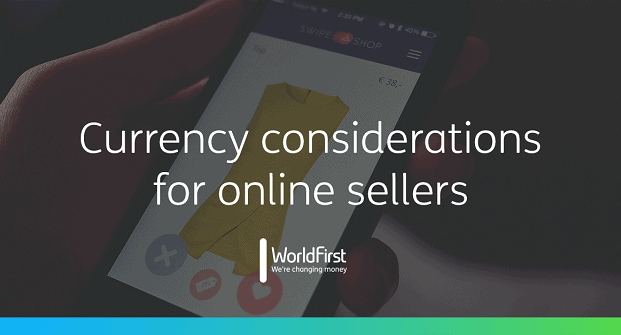There are a lot of things that a global retailer has to consider. From logistics to listings and tax to translation, it’s hard to be on top of everything, particularly if your operation is being run by just a handful of very busy people.
However, it’s worth taking the time to consider your currency requirements. By getting these right, you could be saving a lot of money and protecting your bottom line.
You may not have given it too much thought, but the way in which you purchase goods from overseas suppliers, price your goods on international marketplaces and then repatriate your funds could be costing you a few percent off your bottom line. That’s soon going to add up. In this blog, we’ll run through the basics and show you how you can avoid losing out through the exchange rates.
Buying from international suppliers
When purchasing goods from abroad, the amount you end up paying for stock will depend on what exchange rate you can get. With constant fluctuations in rates, the wrong bit of timing could see rates go against you, and your money not going as far. Then again, if you get your timing right, and rates go in your favor, you’ll be able to get more stock for your money. It’s worth mentioning no-one knows where the rates will go, but things can change very quickly – from one week, day or even hour to the next. Even in the time between negotiating with a supplier and paying them, the rates could have moved quite dramatically.
One way to overcome exchange rate uncertainty is to use what’s known as a forward contract. A forward contract will allow you to fix an exchange rate in advance of the payment, even up to three years ahead, so that you know exactly how much a supplier payment you make in the future will cost you. Bear in mind that you wouldn’t benefit if the rates were to move in your favor in the lead up to the payment date since the rate and amount are fixed, but the point is you can’t guarantee how the rate will move so this option is good for budgeting. If you decide to book a forward contract you’ll be asked to pay an initial deposit to secure the rate.
Pricing your goods in a foreign currency
The exchange rate could be one of the key factors that decides how competitive you’re prepared to be. If the rates are in your favor – and your money goes further – you may decide to lower your prices to make them more appealing to consumers.
For example, back in December 2015, the GBP-EUR rate was as high as 1.42. In the space of just four months the pound has weakened against the euro to around 1.24 in early April 2016 (source: Oanda), and that’s the kind of fluctuation in exchange rates that can seriously impact your revenue. To put this in perspective, if you were sending €10,000 worth of profits back to the UK, you’d have got more than £1,000 less in April than you would have done in December.
If you find that the exchange rates have not gone in your favor, you may have a decision to make with regards to your pricing. You could increase the selling price of your products, which means you’ll receive the same sort of profit from your sales but could also risk you being uncompetitive in the marketplace. The other option is to keep your prices the same, but your profit will be reduced.
The important thing is to stay on top of exchange rate movements and be aware of how these can affect you.
Receiving payments in a foreign currency
Many marketplace operators will offer a service to transfer your sales revenues back to a bank account in your home country and in local currency. What you may not be aware of, however, is that some marketplaces can convert your funds at an uncompetitive exchange rate, which means you end up with less. You could be losing a few percent of the sales revenue you’re converting, and that’s not including the selling fees that you need to pay directly to the marketplace.
A specialist currency exchange company can provide you with access to a native bank account to receive your sales revenue in the currency you’re selling in. You can then arrange to transfer your funds back to your home bank account at a great exchange rate, which could save you money.
For more advice and news on foreign exchange and currency markets, visit the World First blog.




